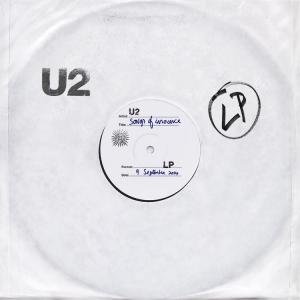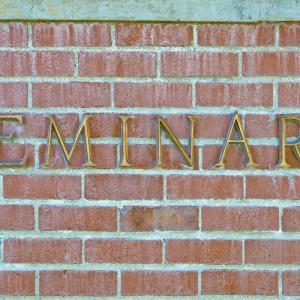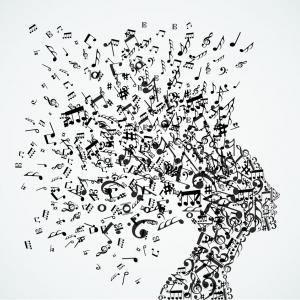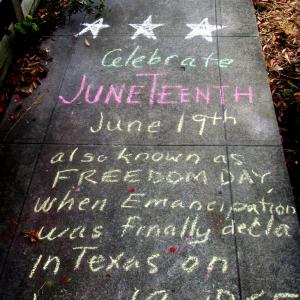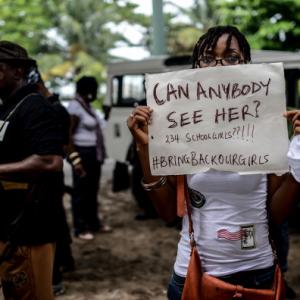
Tripp Hudgins is a doctoral student in liturgical studies and ethnomusicology at the Graduate Theological Union in Berkeley, CA., and is Director of Admissions at American Baptist Seminary of The West. You can read more of his writings on his longtime blog, "Conjectural Navel Gazing; Jesus in Lint Form" at AngloBaptist.org. Follow Tripp on Twitter @AngloBaptist.
Posts By This Author
Love’s Soundtrack

Image via Joe St.Pierre/Flickr
Deaf White Ears
Deaf white ears, children. Deaf white ears. That's what we have. Freedom is freedom for all or it's simply not freedom and Jesus still hangs on that cross today just as truly as he did all those years ago.
What Image of God Do We Believe Men Carry, Exactly?
I am still surprised by the ubiquity of certain attitudes around gender and sexuality, specifically whether married men should have any kind of relationship at all (friendly, etc.) with members of the opposite sex. Forget for the moment the myopic gender construction involved in that particular problem. Let's just take it at face value. Married men must be supervised at all times lest they be tempted to break their marital vows — or run the risk of appearing to break their marital vows.
There Is a Crack in Everything
There is a crack in everything; that's how the light gets in. Everything. Everything has cracks and faults and our best intentions to bring peace and love and justice to the world is cracked. Flawed. To do the work of peace, MacDougall reminded us, is to do the work of repentance, lament, praise and ... getting up and doing the work.
Astonished to Worship

Image via Jjustas/Shutterstock.com
Our son, EP, is nine months old now. Since he was large enough to sling across my chest, I’ve been taking him to Wednesday evening music rehearsals at All Souls Episcopal Parish in Berkeley, Calif. Of course, this took some convincing.
I had to be convinced.
All My Favorite Theologians Are Dying

David Bowie (left) JStone / Shutterstock.com; Alan Rickman JStone / Shutterstock.com
All of my favorite theologians are dying. David Bowie. Alan Rickman. A couple of years ago it was Pete Seeger. It is as if all my favorite theologians are moving on.
Please take me seriously as I say this. It has been a grief-striking week. Just like when Robin Williams passed, there is this void in my life, in my way of knowing God.
Wheaton and the Future of Christian Education
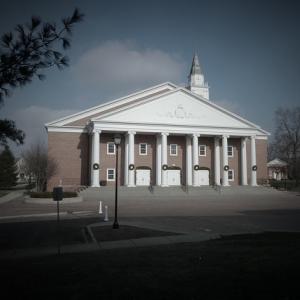
Edman Chapel at Wheaton College, by Joseph Palatinus / Flickr.com
You’ve read it in multiple places and from various sources: Things aren’t what they once were. From Barna to Butler Bass, we have been told time and time again that the American religious landscape has changed — the times have changed, the people have changed, Christian concerns have changed.
But are our institutions, specifically our institutions of higher learning, ready to change?
Weekly Wrap 10.16.15: The 10 Best Stories You Missed This Week
This week's Wrap was guest curated by Sojourners contributor Tripp Hudgins. Read along for his top stories and notes from the week!
There’s a lot that could be said about this week and I’m genetically inclined to say All the Things, but that won’t do. I could talk about the Democratic primary debate, but there’s likely too much to sift through. Sojourners ran a story entitled, “Will Democrats Play the God Card at Their Debate?” It was a fun question and led to interesting results. But I don’t want to share a bunch of links about the debate.
Instead, I want to talk about music and technology and the fabric of society this week. So, put on your tin foil hats, spin your favorite disk, and let’s see what we can find out together.
How Many Hours, Lord?

Crucifix, Willrow Hood / Shutterstock.com
From Baltimore to Berkeley, people are asking the question. Do black lives matter? It has been a year and we cannot seem to find an answer to the question. “Of course they do” some people state. “Then why is it so hard for so many to be black or brown in this country?” is the question that follows.
"Maybe if they just pulled their pants up and turned the music down,” is a common enough retort. Then, as I hope you can see, we’re back where we started.
A young man walks into Mother Emmanuel AME Church and nine lives come to a tragic end. The “politics of respectability” cannot save black and brown lives either. You can be a respected member of the state government, a pastor, a grandmother, and none of that will matter. You can be president of the United States of America and it won’t matter. Your race will be a strike against you.
The Liturgy of Wild Goose
This summer I had the distinct privilege of being asked to serve as the Liturgical Coordinator for the Wild Goose Festival held in Hot Springs, N.C. The festival is a time and place of celebrating the “intersection of Spirit, Justice, Music, and the Arts” that began a few years ago. As such, liturgies abound. Some of them were rather traditional. The Episcopal tent, for example, held Compline services every night. They also broke out of the mold and hosted a songwriter circle and an agape feast. The Goose is like that. Ask the Methodists about the beer tent. Oh, and the Baptists had a coffee shop.
People break from the mold a little. There was a Eucharistic liturgy where a blacksmith literally hammered a rifle into a farm implement. It was an unusual Eucharist, to be sure, but beautiful.
Liturgy and Mission: Why Rachel Held Evans and Keith Anderson Are Right
When did you last think about the relationship between your community's worship practices and their missions? It's such a loaded conversation. What makes for "mission?” Why do we set the two practices — what we do in worship and what we do after — at odds with one another? Is it simple geography? One happens behind the ecclesial closed doors while the other is more public? I want to know when we lost the sense that our liturgies were public events rather than secret rites. But that's another post.
Songs of Ourselves: Grief, Hope, and Sufjan Stevens
Sufjan Stevens’ newest album, Carrie & Lowell (out now), is a heartbreaking meditation on personal grief. It’s also joyful, baffling, and delicately mundane.
In the spirit of a listening party, a few of us sat down to play through the album, sharing liner notes and meditations on the songs that grabbed each of us. Conclusion: it's really, really good. Stream Carrie & Lowell here, and listen along with us below.
“Death With Dignity” — Tripp Hudgins, ethnomusicologist, Sojourners contributor, blogger at Anglobaptist
Tripp: I love the first song of an album. I think of it as the introduction to a possible new friend. “Where The Streets Have No Name” on U2’s Joshua Tree or “Signs of Life” on Pink Floyd’s Momentary Lapse of Reason, that first track can be the thesis statement to a sonic essay.
So, when I get a new album — even in this day of digital albums or collections of singles — a first track can make or break an album for me. I sat down and listened attentively to “Death With Dignity.” It does not disappoint. With it Stevens introduces the subject of the album — his grief around troubled relationship with his mother and her death — as well as the sonic palate he will use throughout the album.
Simple guitar work, layered voicing, and a little synth, the album is musically sparse. The tempo reminds me of movies from the nineteen sixties or seventies where the action takes place over a long road trip.
Catherine Woodiwiss: I was thinking road trip, too. There’s real motion musically, which, given a claustrophobic theme and circular lyrics, is a thankful point of release. It’s a generous act, or maybe an avoidant one — he could have made us sit tight and watch, and he doesn’t quite do it.
Julie Polter: This isn’t a road movie, but the reference to that era of films just made me think of Cat Stevens’ soundtrack for Harold and Maude, especially “Trouble.” (This album is one-by-one bringing back to me other gentle songs of death and duress and all the songs I listen to when I want to cry).
'... A Fragile Sense of Self'
Some of you might be downright shocked to know that many clergy have to undergo a three-day battery of psych tests as part of the ordination process. If a significant issue is discovered, say, addiction or something else (perhaps the main reason these tests have become required), one's ordination process can be slowed down or halted all together. When I was going through the process, I too went through these evaluations.
The result? I have "a fragile sense of self."
What does this really mean? Well, I'm an alcoholic. It's true. I've spoken about it as part of my faith journey (read: testimony; yes, I have a testimony). I don't wave it around like some flag, but I'm not shy about telling people. And I have certainly told the congregations and other organizations I have served about my history with addiction.
Keeping this stuff secret, for me, is poisonous.
At any rate, there it was, "a fragile sense of self" on my evaluation. This caused everyone to pause. The ordination committee had a ton of questions for me. They did the obligatory background check (this is perfunctory; everyone gets one). They checked my references, etc. They did their due diligence to make sure, as best as anyone could, that I was not going to fall off the wagon.
Of course. No one can promise that. Not really.
U2: Seeking An Ecclesiology
By now you have heard that Apple gave you music. Free music. From U2. Now, they paid U2 a lot of money for those tunes and it's pretty clear that it's not the first time that someone paid a U2 a lot of money for their music so that you could have it for free as long as you were a loyal customer.
The U2 back catalogue has done pretty well this week.
Some of us are rather peevish customers, it would seem. There have been numerous articles on the betrayal by either U2 or Apple. Don't they know that our iDevices are private property? Don't they know that we have put a fence around our little corner of the cloud?
Sadly the tech doesn't really work that way and the agreement you checked - we all checked, really - makes it pretty clear that they own the cloud and you merely lease space there. Your iDevice is a portal, no more, no less.
U2: The Art of Hitting One's Stride
Perhaps you heard. U2 has a new album. You can download it from iTunes for free right now. Go. I'll wait. It's free.
Yes, free. This is what has my mind spinning right now. Bono wrote:
"It’s also free to everyone on iTunes thanks to Apple. To celebrate the ten year anniversary of our iPod commercial, they bought it as a gift to give to all their music customers."
So, free to us thanks to the largesse of Apple. Why would that be? Well:
"We’re collaborating with Apple on some cool stuff over the next couple of years, innovations that will transform the way music is listened to and viewed. We’ll keep you posted. If you like Songs of Innocence, stay with us for Songs of Experience. It should be ready soon enough … although I know I’ve said that before …"
Holy Poverty and The Seminary
Paul said, "the foolishness of the cross" not "the stable middle-class lifestyle," if you want my opinion on seminary education, the changing economy, and baptismal identity in general. We bear a responsibility to care for one another as Christians (and beyond) that we have abdicated to the persnickety "marketplace." It's time to talk about holy poverty again, I think.
I can hear my free church friends and colleagues now, "But we don't take a vow of poverty!" It's true. We don't. We remember this historical movement away from the monasteries and the cathedrals, the parish system and the state church. This is an issue of ecclesiology, no question. What I wonder, however, is if in our attempts to not fall into the traps of the past, we simply have settled on the marketplace as our model for ecclesiology. I assume we have.
My degree is a "professional degree," yet within its conceptual framework the notion that I am "professed" is easily lost. I am not called to earn, but to labor, to serve. My work is "worth" nothing. Instead, it is a response to a vocation that in many ways we all share. The wealth of the community affords me the opportunity to respond to that shared call in a particular way. I am not your employee. I am your pastor. I am poor. Any wealth I may posses comes directly from the pockets of others.
Waiting for the Music
I am waiting for the music to return — the sonorous graces of laughter and kitchen clinking, of bird call on the hillside.
I am waiting for the music to return — the precarious arrangement of hope and memory that uplifts and guides.
I am waiting for the music to return — the band, the orchestra, the seisiún, the jam, the people who make and craft sound.
Instead, I am stranded in an eschatological posture like pause on my mp3 player. The Wifi Spirit does not respond and even if I could connect, the playlist I have randomized is sore lacking. I miss the people who make these sounds. I miss their voices.
Ratio Imaginis
Sometimes it is hard to know even where to begin. We stare at this System, this complex web of human behaviors, and the institutions erected to memorialize them, and we simply do not know where to begin. How do we fix it?
"That's just the way it is," we say. "Some things will never change."
Systems are strange beasts. They take incredible human investment to maintain. They are the spaces by which many of us come to know ourselves, to know our place in this world. We identify ourselves in relationship to them. And yet they are so close to us as to be rendered invisible.
Until they hurt us. Until they step on us, exclude us, enslave us, brutalize us.
And this is when it gets interesting, of course; this is when they do their real work, these systems.
Listening As an Act of Love
The story of Pentecost always begins with a sound; the gathering of people and a sound. So often we focus on what is being said at the time in the story and ignore all the listening that takes place.
First, there's a sound.
Second, people hear the sound.
An encounter with the Holy Spirit is predicated on a sound and listening.
I wonder what Peter was thinking that day…with all that noise.
When I read this account from Acts, it’s pretty clear that Peter’s first thought was, “Oh no! Everyone is going to think we’re drunk and it’s only 9:00 in the morning!”
The story of Pentecost is often told as if the most important thing that happened was the speaking in tongues...that people were empowered to speak. Indeed, it’s important. No doubt.
But first, first, they heard something. They listened.
Sermon: In the Breaking — #bringbackourgirls
The first time I heard the news about the 270 Nigerian school girls who had been kidnapped by Boko Haram was last Sunday. I was sitting with the rest of the band at St. Augustine's Catholic Parish during worship. Fr. Gabriel, a priest from Nigeria, was preaching. In his sermon, he offered a litany of events, incredibly difficult events that had transpired in the preceding week as examples of how God does indeed respond when we are in our darkest moments. No matter how we may doubt, fear, or struggle, Jesus will walk through walls to get to us.
All the other events he listed I had heard of. There had been media coverage. People had been given the opportunity to respond to the needs of others.
The girls were kidnapped by Boko Haram on April 14. I had not heard the news until April 27. And it still wasn’t in the papers.
This week I heard the words of Cleopas, “Are you the only stranger in Jerusalem who does not know the things that have taken place there these days?”
So, like the stranger in our story, I asked, “what things?”
According to reports in The Guardian and Smithsonian Magazine 's website , the girls are being sold as brides across the border in Cameroon and Chad for the equivalent of $12 each. This means, of course, that the girls are being sexually assaulted.
Boko Haram is a loosely knit organization. There appears to be no specific hierarchy, only the desire to carve out of Nigerian territory a so-called "pure" Islamic state. Their vision is beyond radical. Violence against other Muslims is not uncommon. They target churches and mosques with the same viciousness. This time they targeted the last school left in the region. They targeted the girls. Translated, Boko Haram means "western education is sinful." To educate girls, then, is a form of Western education. To educate girls is a sin. To sell them across the border is not.
And they need women. They need brides. The girls are being sold. Sold.








